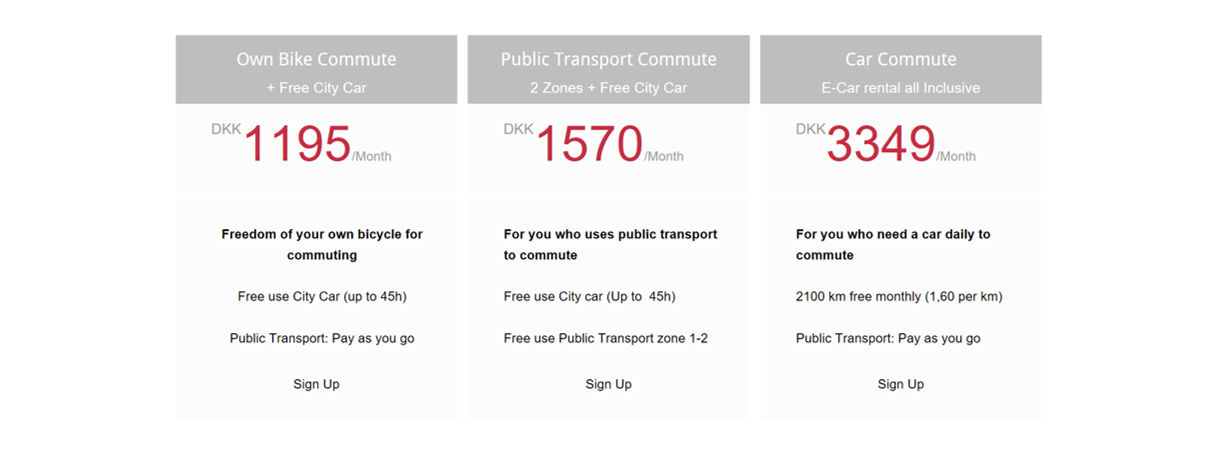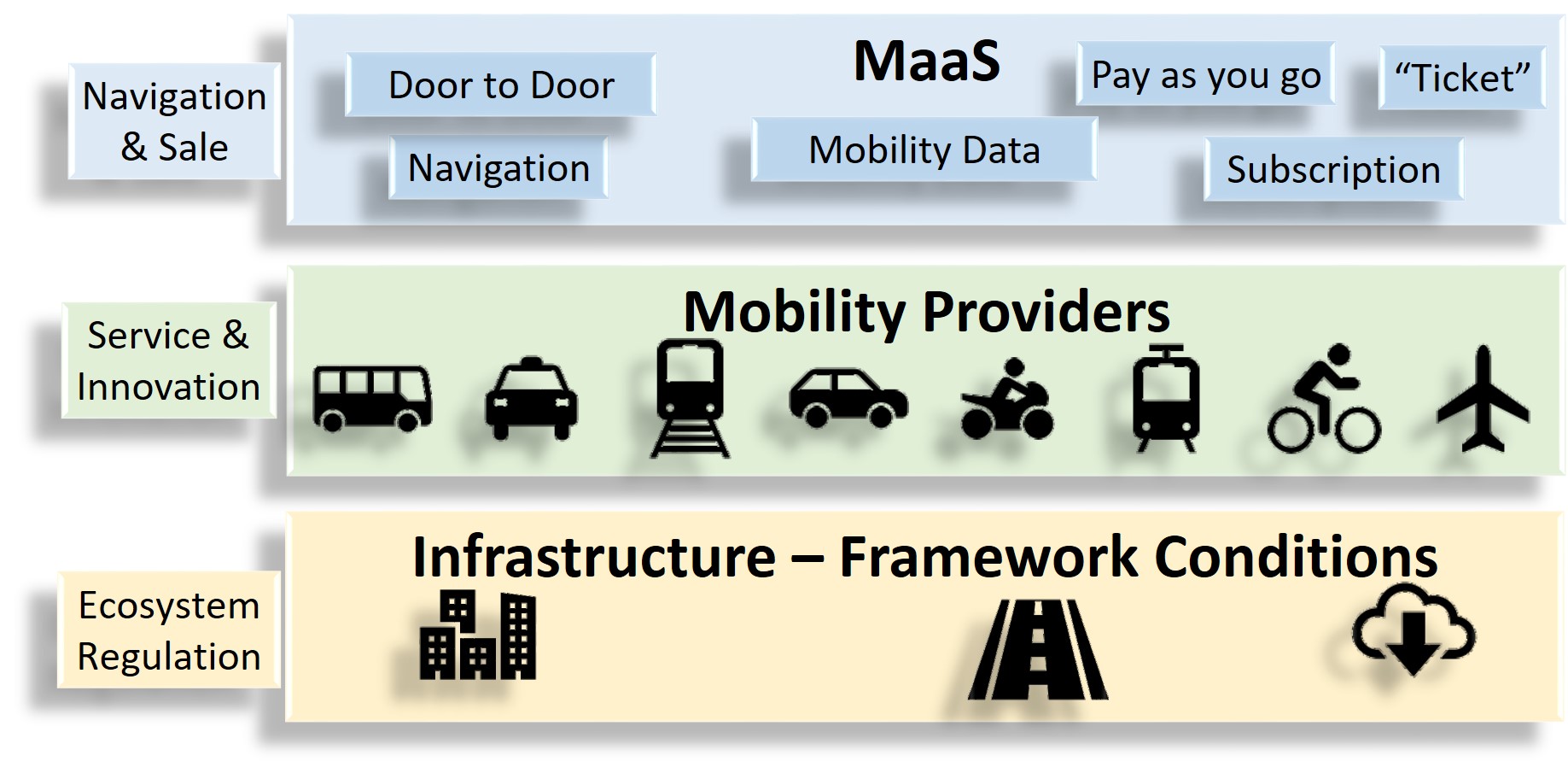Mobility as a Service a.k.a. MaaS is still seen as something in the future. Yet, you can already get some interesting subscription services for your mobility requirements in Copenhagen – even without the MaaS setup.
For the sake of comparison the cost of ownership and use of a (ICE) micro car in Denmark is 4600+ kr. per month according to the 2017 car budget guidance from FDM (the Danish Car Owners Federation)
Here is the monthly cost of alternatives powered by humans or sustainable energy sources (especially if you use s-train, metro or selected buses )

Three subscription service packages supporting your needs of sustainable daily commute to work or education. Source: Idea and Graphics SFMCON. The prices are found Sep. 27, 2017.
If you can substitute use of car daily to work with your bicycle or use public transport you can actually save money by selling your car and rely on the sharing economy for access to a car when needed. If you need a car to commute you can switch to a E-car (300km range) and enjoy a clean commute. On top of this note that the E-rental Is 1000+ kr. less than ownership of a small car.
A mix of 34% bike, 41% car and 25% public transport trips starts or stops in Copenhagen
Daily Copenhagen experiences a mix of 34% bike, 41% car and 25% public Transport trips starting or stopping in the city. (According to Copenhagen Municipality and Danish Technology University Transport habit survey 2015. Some public owned vehicles are powered by electricity and including especially the car sharing schemes there is some E-cars in circulation. Yet as the vast majority of cars, buses and trucks run on diesel or gasoline there is a huge potential in conversion to sustainable energy forms to propel the mobility, also in Copenhagen.
The daily bike ride to work or school is good for both your personal and financial health
Bike commuters can maximize cost savings by dropping ownership to a car. The occasional need for access to a car for local mobility can be covered by a subscription to a city e-car share scheme. For longer trips to family, weekend getaways and vacation there is plenty of room in the mobility budget compared to car ownership to rent a car. A range of options from traditional ICE car rentals, car sharing and even rental of others private cars are available in Copenhagen.
Public Transport commute + car share may be a better deal
If you use public transport for commuting the same applies as for bike commuting. In the example above the start and stop of commute is within zone 1&2 at a cost of 375 kr. Prices increases as more zones is needed to 1260 kr. covering 8 zones. For 8 zones and access to a city car the package is 2455. Still a long way to car ownership starting well over 4000 kr.
E-car all inclusive subscription better deal than ownership of even a small car
The majority of trips are still made in private cars. Now a new subscription model for a E-car rental is on the market for full time rental (Renault Zoe Life 41 kWh). At a price of 3349 kr. /month the offering actually can compete with the cost of ownership of a normal ICE car. According to FDM (the Danish Car Owner Federation) A micro car at a purchase price 100.000 kr.will cost you 4600+ kr./month all inclusive. At a pricetag of 200.000 kr. expect 6375 kr./month and if you go for a car in the 350.000 kr. your monthly cost of ownership and use can be 8664 kr. All prices are based on 20.000 km use per year and from the FDM motor magazine January 2017.
Do we need MaaS if you can build your own mobility subscription already?
Mobility as a Service can be seen as the users guide to the market of shared mobility services. As more options becomes available it gets easier to rely on shared mobility rather than playing safe by a more expensive private ownership of a car.
MaaS is your personal planner and navigator for door to door mobility using shared ressources. However if there are no shared mobility vehicles or services whether public or private in the neighborhood – the MaaS screen is empty.

Prerequisite for a MaaS ecosystem to evolve is that the three levels: Regulation, Mobility service and MaaS navigation and sale, all invest, innovate deliver and cooperate to improve the shared mobility grid, convenience and trust.
For the core providers of shared mobility services the question is: Are you willing to operate with open data, open API and realize the benefit of third party aggregation bundling and selling of your mobility services?
For regulators the question is: Do you need to own the shared mobility ECO System or are we all better of if regulators make the ground rules for a fair market place for mobility services whether public and privat fundet. The Finnish approach of enabling the MaaS value chain by simply using it to buy the mobility services needed by public organizations is quite remarkable.
Could public institutions by channeling needs for mobility through MaaS increase the total volume of business in the shared mobility ECO system? And would it result in reduction of public owned fleets of cars, save taxpayer money and even reduction of carbon footprint?
Discussion and contacts:
How do we best accelerate use of shared mobility to reduce congestion and improve air quality in cities. Where to start and what are the pitfalls. Follow my blog here and updates on LinkedIn.
My mission is to help facilitate better shared mobility and MaaS. What is your challenge on shared mobility? Take the opportunity to open a dialogue directly with me here or email directly here.
Sources of prices: www.greenmobility.com Din Offentlige Transport and www.eon.dk
Disclaimer: All prices and indications as found on the net. There are other options available. Dependent on commute distance, tax deductions are at play and not included in above examples. Mobility needs and patterns are highly individual so make your own calculations and seek guidance if in doubt.
